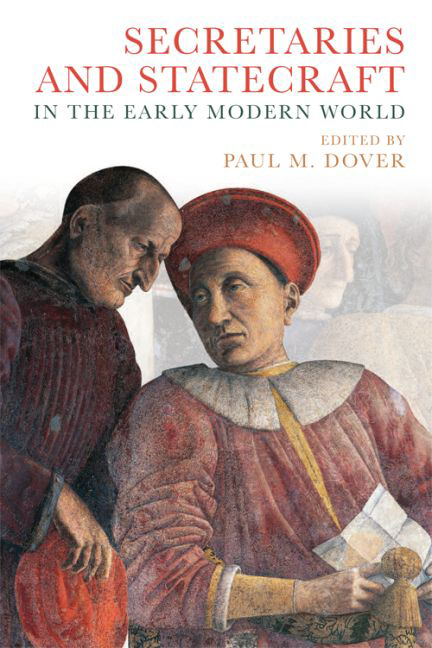Book contents
- Frontmatter
- Contents
- List of Contributors
- 1 Introduction: The Age of Secretaries
- 2 Records, Politics and Diplomacy: Secretaries and Chanceries in Renaissance Italy (1350–c. 1520)
- 3 Mercurino di Gattinara (1465–1530): Imperial Chancellor, Strategist of Empire
- 4 ‘This continuous writing’: The Paper Chancellery of Bernhard Cles
- 5 Parables and Dark Sentences: The Correspondence of Sir William Cecil and William Maitland (1559–73)
- 6 Axel Oxenstierna and Swedish Diplomacy in the Seventeenth Century
- 7 Statecraft and the Role of the Diplomat in Ducal Savoy: The Career of Alessandro Scaglia (1592–1641)
- 8 Richelieu, Mazarin and Italy (1635–59): Statesmanship in Context
- 9 The Learned Ideal of the Mughal Wazīr: The Life and Intellectual World of Prime Minister Afzal Khan Shirazi (d. 1639)
- 10 Reconsidering State and Constituency in Seventeenth-Century Safavid Iran: The Wax and Wane of the Munshi
- 11 Choreographers of Power: Grigorii Kotoshikhin, State Secretaries and the Muscovite Royal Wedding Ritual
- 12 Eberhard von Danckelman and Brandenburg's Foreign Policy (1688–97)
- 13 Chancellor of State: Prince Wenzel Anton Kaunitz, the Habsburg Foreign Office and Foreign Policy in the Era of Enlightened Absolutism
- Index
12 - Eberhard von Danckelman and Brandenburg's Foreign Policy (1688–97)
Published online by Cambridge University Press: 21 November 2017
- Frontmatter
- Contents
- List of Contributors
- 1 Introduction: The Age of Secretaries
- 2 Records, Politics and Diplomacy: Secretaries and Chanceries in Renaissance Italy (1350–c. 1520)
- 3 Mercurino di Gattinara (1465–1530): Imperial Chancellor, Strategist of Empire
- 4 ‘This continuous writing’: The Paper Chancellery of Bernhard Cles
- 5 Parables and Dark Sentences: The Correspondence of Sir William Cecil and William Maitland (1559–73)
- 6 Axel Oxenstierna and Swedish Diplomacy in the Seventeenth Century
- 7 Statecraft and the Role of the Diplomat in Ducal Savoy: The Career of Alessandro Scaglia (1592–1641)
- 8 Richelieu, Mazarin and Italy (1635–59): Statesmanship in Context
- 9 The Learned Ideal of the Mughal Wazīr: The Life and Intellectual World of Prime Minister Afzal Khan Shirazi (d. 1639)
- 10 Reconsidering State and Constituency in Seventeenth-Century Safavid Iran: The Wax and Wane of the Munshi
- 11 Choreographers of Power: Grigorii Kotoshikhin, State Secretaries and the Muscovite Royal Wedding Ritual
- 12 Eberhard von Danckelman and Brandenburg's Foreign Policy (1688–97)
- 13 Chancellor of State: Prince Wenzel Anton Kaunitz, the Habsburg Foreign Office and Foreign Policy in the Era of Enlightened Absolutism
- Index
Summary
The scholarship on Eberhard von Danckelman (1643–1722), chief minister of Elector Friedrich III of Brandenburg from 1688 to 1697, is a curious lot. Nearly all historians who have worked on this period grant that Danckelman had a leading, and at times preponderant, role in crafting state policy – especially foreign policy – at a time when Brandenburg was deeply involved in matters of continental importance, including active support of William III's seizure of the British throne in the Glorious Revolution and significant participation in the Nine Years’ War against Louis XIV and the emperor's struggle with the Ottomans in Hungary. Furthermore, those who have studied Danckelman have held him in almost uniformly high regard, not least the paragons of nineteenth- and early twentieth-century Prusso-German nationalist historiography, who have portrayed him as the exemplary Prussian civil servant and worthy steward of the legacy of Friedrich III's father, the ‘Great Elector’ Friedrich Wilhelm. As an exemplar of that most despised and critiqued political species, the princely favourite, Danckelman has enjoyed remarkably good press.
All of this makes it that much more surprising that the actual body of writing focused on Danckelman is unexpectedly thin. The Brandenburg minister has been the subject of no full-length biography and scarcely a handful of shorter studies and article-length treatments, and the majority of those have focused almost exclusively on his dramatic fall from power in 1697. In most works examining Friedrich's reign, the longest sustained discussion of Danckelman is dedicated to the story of his fall. As the bulk of documentary material related to his removal from office and subsequent imprisonment consists of the accusations and testimony of his many enemies, the historiographical record rests on relatively few of Danckelman's own words, despite the fact that he spent the better part of a decade sifting through enormous mountains of paperwork on a nearly daily basis. The ironic upshot is that an effort to understand Danckelman's period of influence has much the feel of an exercise in microhistory, reading against the grain of often hostile legal records to discern the actual nature and substance of Danckelman's power.
- Type
- Chapter
- Information
- Secretaries and Statecraft in the Early Modern World , pp. 254 - 272Publisher: Edinburgh University PressPrint publication year: 2016



